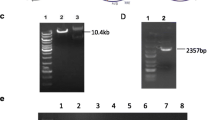Abstract
It is well known that tumor angiogenesis plays an important role in local growth and metastasis of oral cancer; therefore, inhibiting angiogenesis is considered to be effective for treating oral cancer. This study aimed to investigate the effectiveness of systemically available antiangiogenic gene therapy targeting vascular endothelial growth factor (VEGF), which is one of the most important angiogenesis accelerators. We administered a soluble form of VEGF receptor-expressing gene incorporated into adenovirus (AdVEGF-ExR) intraperitoneally to nude mice to which oral cancer cell lines (SAS, HSC-3, and Ca9-22) had been transplanted subcutaneously in vivo to inhibit angiogenesis and tumor proliferation. Then, we measured tumor volumes over time, and tumors were enucleated and examined histopathologically and immunohistologically at 28 days after AdVEGF-ExR administration. Compared to the controls to which we administered AdLacZ or saline, significant antiproliferative effects were observed (P < 0.05) in the AdVEGF-ExR administration group, and extensive tumor necrosis was found histopathologically. Immunohistochemical analysis with CD34 (NU-4A1) revealed tumor angiogenesis was suppressed significantly (P < 0.05), and that with ssDNA revealed apoptosis induction was significantly high (P < 0.05) in the AdVEGF-ExR group. However, analysis with Ki-67 (MIB-1) revealed tumor proliferative capacity was not significantly different between the groups. Consequently, we consider that AdVEGF-ExR administration achieved tumor growth suppression by inhibiting angiogenesis and inducing apoptosis, but not by inhibiting the proliferative capacity of tumor cells. Neither topical administration of a soluble form of VEGF receptor (sVEGFR) to the tumor nor a megadose was needed to achieve this inhibition effect. These results suggest gene therapy via sVEGFR would be an effective oral cancer therapy and benefit future clinical applications.
Similar content being viewed by others
References
Folkman J. Angiogenesis in cancer, vascular, rheumatoid and other disease. Nat Med 1995;1:27–31.
Weidner N, Semple JP, Welch WR, Folkman J. Tumor angiogenesis and metastasis: correlation in invasive breast carcinoma. N Engl J Med 1991;324:1–8.
Smith BD, Smith GL. Prognostic significance of vascular endothelial growth factor protein levels in oral and oropharyngeal squamous cell carcinoma. J Clin Oncol 2000;18:2046–2052.
Okada Y, Mataga I, Katagiri M, Ishii K. An analysis of cervical lymph nodes metastasis in oral squamous cell carcinoma. Relationship between grade of histopathological malignancy and lymph nodes metastasis. Int J Oral Maxillofac Surg 2003;32:284–288.
Ueno H, Li J-J, Tomita H, Yamamoto H, Pan Y, Kanegae Y, Saito I, Takesita A. Quantitative analysis of repeated adenovirus-mediated gene transfer into injured canine femoral arteries. Arterioscler Thromb Vasc Biol 1995;15:2246–2253.
Miyake S, Makimura M, Kanegae Y, Harada S, Sato Y, Takamori K, Tokuda C, Saito I. Efficient generation of recombinant adenoviruses using adenovirus DNA-terminal protein complex and a cosmid bearing the full-length virus genome. Proc Natl Acad Sci U S A 1996;93:1320–1324.
Ueno H, Li J-J, Masuda S, Qi Z, Yamamoto H, Takesita A. Adenovirus-mediated expression of the secreted form of basic fibroblast growth factor (FGF-2) induces cellular proliferation and angiogenesis in vivo. Arterioscler Thromb Vasc Biol 1997;17:2453–2460.
Takayama K, Ueno H, Nakanishi Y, Sakamoto T, Inoue K, Shimizu K, Oohashi H, Hara N. Suppression of tumor angiogenesis and growth by gene transfer of a soluble form of vascular endothelial growth factor receptor into a remote organ. Cancer Res 2000;60:2169–2177.
Niwa H, Yamamura K, Miyazaki J. Efficient selection for highexpression transfectants with a novel eukaryotic vector. Gene (Amst) 1991;108:193–199.
Swisher SG, Roth JA, Nemunaitis J, Lawrence DD, Kemp BL, Carrasco CH, Connors DG, El-Naggar AK, Fossella F, Glisson BS, Hong WK, Khuri FR, Kurie JM, Lee JJ, Lee JS, Mack M, Merritt JA, Nguyen DM, Nesbitt JC, Perez-Soler R, Pisters KM, Putnam JB Jr, Richli WR, Savin M, Schrump DS, Shin DM, Shulkin A, Walsh GL, Wait J, Weill D, Waugh MK. Adenovirus-mediated p53 gene transfer in advanced non-small-cell lung cancer. J Natl Cancer Inst 1999;91:763–771.
Nemunaitis J, Swisher SG, Timmons T, Connors D, Mack M, Doerksen L, Weill D, Wait J, Lawrence DD, Kemp BL, Fossella F, Glisson BS, Hong WK, Khuri FR, Kurie JM, Lee JJ, Lee JS, Nguyen DM, Nesbitt JC, Perez-Soler R, Pisters KM, Putnam JB, Richli WR, Shin DM, Walsh GL, Merritt J, Roth J. Adenovirusmediated p53 gene transfer in sequence with cisplatin to tumors of patients with non-small-cell lung cancer. J Clin Oncol 2000;18:609–622.
Swisher SG, Roth JA, Komaki R, Gu J, Lee JJ, Hicks M, Ro JY, Hong WK, Merritt JA, Ahrar K, Atkinson NE, Correa AM, Dolormente M, Dreiling L, El-Naggar AK, Fossella F, Francisco R, Glisson B, Grammer S, Herbst R, Huaringa A, Kemp B, Khuri FR, Kurie JM, Liao Z, McDonnell TJ, Morice R, Morello F, Munden R, Papadimitrakopoulou V, Pisters KM, Putnam JB Jr, Sarabia AJ, Shelton T, Stevens C, Shin DM, Smythe WR, Vaporciyan AA, Walsh GL, Yin M. Induction of p53-regulated genes and tumor regression in lung cancer patients after intratumoral delivery of adenoviral p53 (INGN 201) and radiation therapy. Clin Cancer Res 2003;9:93–101.
Lin P, Buxton JA, Acheson A, Radziejewski C, Maisonpierre PC, Yancopoulos GD, Channon KM, Hale LP, Dewhirst MW, George SE, Peters KG. Antiangiogenic gene therapy targeting the endothelium-specific receptor tyrosine kinase Tie2. Proc Natl Acad Sci USA 1998;95:8829–8834.
Author information
Authors and Affiliations
Corresponding author
Rights and permissions
About this article
Cite this article
Okada, Y., Ueno, H., Katagiri, M. et al. Experimental study of antiangiogenic gene therapy targeting VEGF in oral cancer. Odontology 98, 52–59 (2010). https://doi.org/10.1007/s10266-009-0117-4
Received:
Accepted:
Published:
Issue Date:
DOI: https://doi.org/10.1007/s10266-009-0117-4




